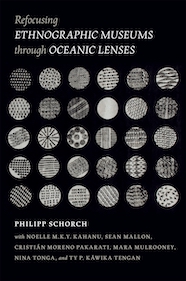 Philipp Schorch
Philipp Schorch
The book
Refocusing Ethnographic Museums through Oceanic Lenses offers a collaborative ethnographic investigation of Indigenous museum practices in three Pacific museums located at the corners of the so-called Polynesian triangle: Bernice Pauahi Bishop Museum, Hawai'i; Museum of New Zealand Te Papa Tongarewa; and Museo Antropológico Padre Sebastián Englert, Rapa Nui.
Since their inception, ethnographic museums have influenced academic and public imaginations of other cultural-geographic regions and as a result, Euro-Americentric projection of anthropological imaginations has come under intense pressure. At the same time, (post)colonial renegotiations in former European and American colonies have initiated dramatic changes to anthropological approaches through Indigenous museum practices.
This book shapes a dialogue between Euro-Americentric myopia and Oceanic perspectives by offering historically informed, ethnographic insights into Indigenous museum practices grounded in Indigenous epistemologies, ontologies and cosmologies. In doing so, the book employs Oceanic lenses that help to reframe Pacific collections in, and the production of public understandings through, ethnographic museums in Europe and the Americas.
Following this line of reasoning, Refocusing Ethnographic Museums through Oceanic Lenses sets out to offer insights into Indigenous museologies across Oceania to recalibrate ethnographic museums, collections and practices through Indigenous Oceanic approaches and perspectives. This, in turn, should assist any museum scholar and professional in rethinking and redoing their respective institutional settings, intellectual frameworks and museum processes when dealing with Oceanic affairs; and, more broadly, in doing the 'epistemic work' needed to confront 'coloniality', not only as a political problem or ethical obligation but 'as an epistemology, as a politics of knowledge'.
Reviews
In many ways, the book draws attention to the long history of Indigenous practices, and it does so in an entangled way in multiple locales. I appreciated the deep insights and the challenges shared by colleagues across the oceans, as they rearticulate the complex and nuanced ways in which we work. In many ways, by reviewing this text during the season of Matariki (the Māori New Year), it was a pleasure to foreground Indigenous museum practices through a renewed sense of collaboration. — Safua Akeli Amaama, Museum of New Zealand Te Papa Tongarewa, for Museum Worlds
Refocusing Ethnographic Museums through Oceanic Lenses offers an important and potentially influential model, striking a balance between the single-authored volume and the edited collection, attractively bringing forward genuine multi-vocality, and the distinctive expertise of those bringing specific Indigenous perspectives/analyses/concepts, yet with a far more robust structure and coherence than the typical edited book.' — Nicholas Thomas, Museum of Archaeology and Anthropology, University of Cambridge
Philipp Schorch's new monograph is an insightful and thought-provoking addition to the growing body of scholarly literature on museum studies in the Pacific. Both areas of study—Pacific Island studies and museum studies—are witnessing active and field-changing discussions. [The book] is an exemplar of what so many in the field of museology are attempting to describe when they refer to multi-vocality and co-curation. Readers will find the individual case studies fascinating, ranging from the founding and administration of museums in settler colonial settings to the reimagining of curatorial work. . . . Refocusing Ethnographic Museums through Oceanic Lenses will productively inform interdisciplinary projects that are situated at the crossroads of museology, Pacific Island studies, anthropology, translation, ethnography, and public administration. —Theodore S. Gonzalves, Smithsonian National Museum of American History, International Journal of Heritage Studies (online, 10 August 2020)
Author
Philipp Schorch is a professor of museum anthropology at Ludwig-Maximilians-Universität in Munich, Germany, and honorary fellow at the Alfred Deakin Institute for Citizenship and Globalisation, Deakin University, Australia.
Contributors
Noelle M.K.Y. Kahanu, Sean Mallon, Cristián Moreno Pakarati, Mara Mulrooney, Nina Tonga and Ty P. Kāwika Tengan
A co-publication with University of Hawaii Press. This edition available in New Zealand and Australia only.
Publication details
Paperback, 150 x 230mm, 316 pp
ISBN 978-1-98-859239-8, $NZ/A49.95
IN-STORE: AUG 2020
